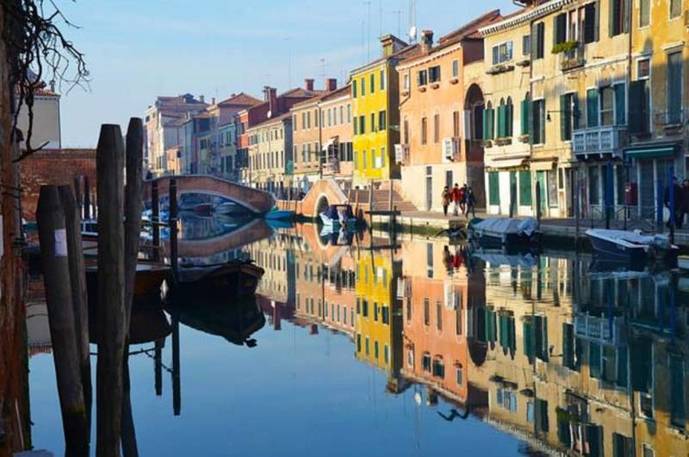


One reason: whereas the vacations taken by Italians routinely lasted a month, today's are shorter, with many taking only a week or just five days off from work. The sagging economy is one explanation: travel is too costly. Over-crowded tourist venues is another as is a certain fear of airports and train stations and of flying and riding in trains even though the psychotic and terror attacks plaguing North Europe have yet to come to Italy.
Demopolis director Pietro Vento, however, says that the Italians sticking close to home this year do so because they are "making a happy choice." Many simply want to enjoy seeing famed Italian artistic and archaeological sites near to home, but which they never have the time during the year to visit. I myself, for the first time in a quarter century of having a house in Trevignano Romano, yesterday made my very first visit to the lovely Civic Museum at Bracciano Romano, a 15" drive, to see its magnificent ancient Roman statue of Apollo. Returning home I stopped at the 17th km marker to see a mini-lakeside park, to admire the still visible underwater ruins of an ancient Roman villa. (Fortunately I had a big plastic bag in my car in which I collected picnic rubbish, including aluminum boxlets for lasagna, left by my fellow visitors.)
The stay-at-home choice "is partly a reflection of the modern liquid society, which lacks points of reference," Asterio Savelli, University of Bologna sociologist specialized in tourism. "People used to go on vacation in exotic tourist localities as a show of their status -- a way to identify oneself with a social role that annouces, 'I'm the kind of person who goes to Rimini at Ferragosto and to the Maldives in December,' he told reporter Isabella Colombo.
(See: >> [2])
For those who do travel, the good news is that Rome's Leonardo Da Vinci Airport at Fiumicino, which now handles a stunningly large number, 40 million passengers a year, has just been named second best in Europe by the Airports Council International (ACI). In a tie with Munich, Fiumicino outperformed the top international airports in Paris, Amsterdam and Madrid, and was bested only by London's.
Lucky tourists in Venice are in for a special treat: a production of Shakespeare's The Merchant of Venice, in which, five centuries later, Shylock returns to the oldest Jewish quarter in Europe, the Ghetto. Beginning July 26 through July 31 (with the exception of Saturday July 30), the play is being presented in English, with inserts in Venetian dialect, directed by Karin Coonrod. The project was developed by Prof. Shaul Bassi of the Venetian University of Ca' Foscari in partnership with the city of Venice to celebrate the 500th anniversary of the Ghetto. Performing the play is the Compagnia de' Colombari, a company of 20 actors which operates primarily in New York but also in Orvieto. Two hundred seats have been made available in the main piazza of the Ghetto, the Campoa. Music is provided by American trombonist Frank London. (For further details, see: http://www.themerchantinvenice.org/)
Not all vacations function smoothly, but even those can sometimes bring out the best of humankind. In the Duomo of Milan on Tuesday night a tourist was in the restroom when the cathedral guards locked it, leaving him to sleep on the roof among the elegant parapets. "I didn't want to create any alarm so I just lay down to sleep," he said Wednesday. Elsewhere in Milan, artist Riccardo Zangelmi has created a sculpture utilizing 130,000 pieces of Lego with which he has constructed two giant hands which shield an endangered young tree on a sidewalk.
Others in Milan are young artists: in the past three years 11,300 migrant children from Egypt, Eritrea, Somalia, Syria and elsewhere, including 554 unaccompanied, have arrived in the Central Station, especially in summertime. There volunteers from the charity Albero della Vita take them in hand until a better solution is found; to know them better and to keep the younger ones occupied, they make available paper and crayons. The drawings often show boats, starry skies, their nation's flag alongside Italy's, but also tanks (see >> [3])
In its way the worst (and best) summer tourism story, which has made the rounds of the country's news sources, came from the beachfront of Roseto in the Abruzzo, where a visitor complained that his hotel had not informed him ahead of time that there would be "myriad disabled young people" and "children in wheelchairs." His reason: it upset his own children. When this comment appeared on Facebook, it ignited a fireworks of reactions. "Shame!" was only one. "People like him should just stay home because he does not know the value of life and it difficulties." Others suggested that he teach his children to befriend those in wheelchairs, not to avoid them. And from the Abruzzi section of the association which arranges vacations for disabled youngsters: "The hotel is a positive example for many other tour operators."
Source URL: http://ftp.iitaly.org/magazine/focus/op-eds/article/italians-enjoy-holidays-close-home
Links
[1] http://ftp.iitaly.org/files/021469658126jpg
[2] http://www.donnamoderna.com/news/tendenze/vacanze-ferie-a-casa-italiani
[3] http://: http://www.alberodellavita.org/